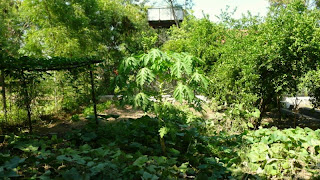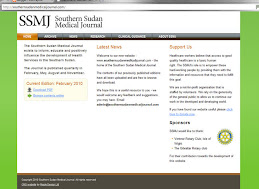We can hardly believe that we’ve only got a couple of weeks left in Juba. I think we both have very mixed feelings about this. There’s a tension of not wanting to leave the people and the work we’re doing, but also missing home. It’ll be good to be back with family and friends for Christmas, but on the downside we haven’t had a day below 30 degrees* C for the past 4 months so we’re anticipating absolutely freezing back in the home-land.
*(can't do superscript in blogger)
Yesterday we had the hilarious experience of being mobbed (in a nice way) by a group of school children on our walk into work. It was too good a photo opportunity to miss, which of course excited them further, so I’m sure their teacher wasn’t too pleased that morning. It’s funny how even at this stage amongst all the bad stuff we see this place can still surprise you completely out of the blue and bring a smile to your face.
Right – down to business. The Emergency Medical Ward is continuing to go very well. The nursing staff are just great (great fun and also great at nursing) which makes it a real pleasure to work on. The morning team of nurses actually volountarily stayed for a couple of hours after their shift this afternoon (for no extra money) because we'd had a busy morning with some sick patients and they wanted to make sure as much of their work was wrapped up as possible so the afternoon team didn't get lumped with it. I've never seen that in the UK. Also the junior doctors are unanimously in favour of the system, and the consultants are also very impressed. Sustainability is the name of the game at this stage, and we’re making good in-roads into this as well.
There's been a delegation of consultant surgeons, anaesthetists and nurses come over from Saudi Arabia here for the past week working and teaching in the hospital. It's been quite an insightful experience actually watching 'Juba newbies' come in and do similar things to what our link is doing. By all accounts they've been doing a good job.
We’re keeping a very close eye on mortality rates in the department, and at this juncture they are looking quite good. I think one of the things we feared was that we could cut down 24 hour mortality on our ward, but it would all shift to day 2 when they were transferred. However, this is just not happening at all, which vindicates our repeated emphasis that early recognition and intervention really does have a better overall outcome.
Patients are still dying on our ward of course (and we’re keeping a detailed log of who and why) but the key thing for us as doctors is that we know in good conscience that they probably would have died in a UK hospital. This is mainly down to the late presentation issue, which is somewhat outside of our influence. In other words, we’re (and by’ we’ I mean the whole team on the ward) are doing everything possible for them. Mortality in the department of medicine is hovering around 4% at present, from over 5% in July. This may not seem much, but it means that the new ward system is saving 1 life every 100 admissions, which is roughly every 4 days. (ie. the number needed to treat is 100 for those statistically minded.) It’s still early days but I know that anecdotally I’ve seen the nursing staff save the life of patients who would have otherwise died. It would be the icing on the cake (in a world of evidence based medicine) to demonstrate it formally, but we’ll see.
The UN arranged a flying visit by John Holmes, one of their top officials this afternoon who was looking into the state of healthcare in the Southern Sudan. He was only here for a day I think which was why he couldn’t get out into the rural areas where things are much more dire, so he came to the hospital here instead. The Jubans of course were only too delighted to proudly show the whole entourage round which included (unexpectedly I may add) a trip to our new emergency ward. Luckily it was tidy... The Minister of Health came visiting the other day (see photo in an earlier post) and was generally pleased with the clinical care, but thought that the place was looking a bit dirty and wanted more bed sheets etc. So we’ve been working on making the place look a bit prettier recently (blue sheets for the male bay and pink for the female no less!) which was convenient for this visit. Apparently he said to Dario afterwards that "Juba Teaching Hospital is one of the best hospitals in the developing world I've seen." High praise indeed.
 Gratuitous cute photo from one of my favourite wards.
Gratuitous cute photo from one of my favourite wards.It's getting into mango season now as you can see.
OK, that will do for now.
Jem-ez & Daff-eed






























